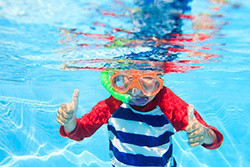 Summer is here! A dip in the pool is likely on many people’s minds. The reprieve from the heat might be worth the costs of installing a pool right in your own backyard. But before cannonballing into a decision about getting a pool or buying a home that already has one, it’s important to think about pool safety and insurance.
Summer is here! A dip in the pool is likely on many people’s minds. The reprieve from the heat might be worth the costs of installing a pool right in your own backyard. But before cannonballing into a decision about getting a pool or buying a home that already has one, it’s important to think about pool safety and insurance.
Do You Have Proper Insurance Coverage?
Generally speaking, pools are covered under your homeowners policy. However, it is important to talk with your insurance advisor to understand your coverage as there are some exclusions and conditions that apply. Having a pool increases your exposure to risk - both liability stemming from medical or legal expenses should someone get hurt and potential property damage.
Decks, water slides, and other pool equipment or accessories add value to your pool area. Talk with your insurance advisor to be sure you have adequate property coverage limits for not just your pool, but also any accessories. Should damage occur, you want to be sure you have enough coverage to pay for the repairs.
Don’t forget about liability coverage. Thousands of pool-related injuries occur each year. And according to the CDC, every day 10 people die from unintentional drowning. It has become the 5th leading cause of unintentional injury death in the US. If someone gets injured at your pool you could be held liable and incur medical or legal expenses. A standard homeowners insurance policy does carry liability protection, but you should consider increasing the liability coverage or investing in a personal umbrella policy to provide you with added protection.
Pool Safety And Risk Management
Not only do safety measures provide peace of mind, but some may be required when having a pool. The community you reside in or your insurance company may have safety regulations for barriers around your pool such as fences, walls, gates, and pool covers, as well as pool signage. Take time to find out what your community requires – contact your town or municipality to identify any local safety standards or building regulations that may apply. The U.S. Consumer Product Safety Commission also provides a comprehensive guide with their recommendations for pool safety barriers.
The Insurance Information Institute recommends the following tips to keep you, your family, and all pool users safe this summer:
- Put fencing around the pool area to keep people from using the pool without your knowledge. In addition to the fences or other barriers required by many towns, consider creating “layers of protection” around the pool, i.e. setting up as many barriers as possible (door alarms, locks, and safety covers) to the pool area when not in use.
- Never leave small children unsupervised—even for a few seconds. And never leave toys or floats in the pool when not in use as they may prove to be a deadly temptation for toddlers trying to reach them.
- Keep children away from pool filters and other mechanical devices as the suction force may injure them or prevent them from surfacing. In case of an emergency, know how to shut off these devices and clearly post this information for easy use.
- Be sure all pool users know how to swim. Learners should be accompanied by a good swimmer. If you have children, have them take swimming lessons as early as possible.
- Don’t swim alone or allow others to swim alone.
- Check the pool area regularly for glass bottles, toys, or other potential accident hazards.
- Keep speakers, radios, and other electrical devices away from pools or nearby wet surfaces.
- Don’t allow anyone who has been drinking alcohol to use the pool.
- Pay attention to the weather. Excessive heat can cause dizziness, which can dangerous around a pool. And never swim during rain or lightning storms.
- Never dive into an above-ground pool and check the water depth before plunging into an in-ground pool. Keep clear of the area near a diving board.
- Don’t swim if you’re tired or have just finished eating.
- In the event of an accident, clearly post emergency numbers on the phone. Keep a first aid kit, ring buoys, and reaching poles near the pool. You may also want to consider basic first aid and CPR training.
While fun, all pools—whether a simple above-ground kiddy pool to an in-ground Olympic style—can be dangerous. It is important to take the necessary precautions to mitigate risk, protect yourself from liability, and keep everyone swimming safely this summer.




